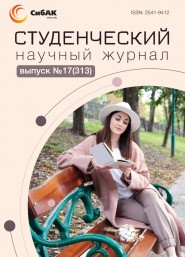Статья опубликована в рамках: Научного журнала «Студенческий» № 17(313)
Рубрика журнала: Педагогика
Скачать книгу(-и): скачать журнал часть 1, скачать журнал часть 2, скачать журнал часть 3, скачать журнал часть 4, скачать журнал часть 5, скачать журнал часть 6, скачать журнал часть 7
EDUCATION OF TRADITIONAL VALUES IN HISTORY LESSON
ABSTRACT
The article examines the role of school history education in shaping traditional values among students. The author analyzes methods and approaches that effectively integrate an educational component into history lessons, with a particular focus on patriotism, moral principles, respect for cultural heritage, and family traditions. Examples from teaching practice are discussed, along with potential challenges and ways to overcome them. The article is intended for teachers, methodologists, and anyone interested in issues of spiritual and moral education in modern schools.
Keywords: traditional values, education, history lessons, patriotism, moral development, teaching methods.
In the context of globalization and rapid changes in society, traditional values may lose their importance. History lessons play a key role in transmitting these values to the younger generation, helping to preserve national and cultural identity. History as an academic subject not only provides knowledge about the past, but also forms students' sense of responsibility for the future of their country.
It is worth noting that modern society is facing such challenges as the erosion of moral norms, the growth of individualism and a decrease in interest in history, and they, in turn, can become a tool to counteract these trends, forming stable moral guidelines for students.
It is quite important that in recent years, the educational policy of many countries, including Russia, has paid great attention to the education of traditional values. This is reflected in government documents such as the Federal State Educational Standards, which emphasize the importance of spiritual and moral education. History as a subject allows you to integrate knowledge about the past with moral lessons. The study of historical events, the role of personality in history, and examples of heroism contributes to the formation of students' respect for traditions and moral principles.
Thus, the topic combines elements of history, pedagogy, psychology and cultural studies, which makes it interesting to study and allows you to consider the problem from different points of view. Traditional values are a stable system of spiritual, moral, cultural and social norms that are passed down from generation to generation and form the basis of a society's identity. They reflect the collective experience of the people, their historical memory, religious and ethical ideals, as well as behavioral patterns that ensure continuity and stability of social development.
Traditional values have been formed over the centuries, preserved in customs, folklore, religious teachings, and family life. They are not fixed dogmas, but they adapt to new conditions, preserving their essence. They form a common worldview, reducing the level of conflict and strengthening social solidarity.
Considering these points, it can undoubtedly be argued that traditional values are a "cultural code" that allows society to maintain stability in a changing world. They do not contradict development, but require meaningful preservation through education, art, and the institution of the family. Their loss leads to an identity crisis, and reasonable integration into modernity is the key to a harmonious future.
History is not just a subject about the past; it is a powerful tool for shaping personality, national identity, and value systems. In history lessons, students not only study dates and events, but also learn to understand the moral lessons of the past, recognize their cultural identity, and adopt traditional values that unite society. The subject of history itself acts as the basis of patriotic education in school. Patriotism in general is one of the key traditional values, and history plays a crucial role in its formation, as it vividly forms an idea of it through the use of historical examples, which in turn inspire students to respect their country. Studying victories and defeats helps to understand the value of independence and the need to protect the Motherland. Local history (the history of the native land) remains very important in this matter, since it develops a sense of belonging to a small homeland. Without knowledge of history, patriotism becomes abstract, and with it, respect for traditional values such as duty, honor, and service to society.
History provides invaluable lessons of good and evil, justice and betrayal, Forms moral guidelines through historical truths, for example, mercy (the feat of doctors during the wars), loyalty to principles (Decembrists, dissidents who defended the truth), diligence and much more.
Thus, traditional values are not a relic of the past, but the foundation of a healthy future. By educating them in new generations, we preserve not only the cultural heritage, but also the very soul of the people. History lessons are not just a transfer of knowledge, but an essential tool for fostering traditional values. They form patriotism, morality, respect for culture and family, as well as critical thinking, which is necessary in the modern world. Without this, society loses its roots and becomes susceptible to destructive ideas. Therefore, history teaching should be not only informative, but also educational, so that new generations can be proud of their past and build a decent future.
References:
- Babansky, Yu.K. Teaching methods in modern secondary school – Moscow, 1985. – 208 p.
- Basova N.V. Pedagogy and practical psychology. – Rostov-on-Don, 2000. – 416 p.
- Vygotsky L.S. The problem of cultural development of a child. Moscow, 1928, 284 p.
- Likhachev D.S. Education of dignity and culture of addressing the interlocutor. Moscow, 2010. 109 p.
- Sukhomlinsky V.A. How to raise a real person. Pedagogical heritage. – M.: Pedagogika 1990. – 288 p.


Оставить комментарий